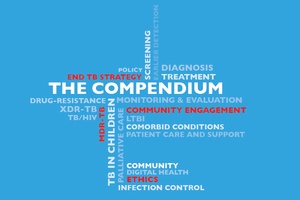Compendium of WHO guidelines and associated standards
Compendium of WHO guidelines and associated standards: ensuring optimum delivery of the cascade of care for patients with tuberculosis
3 November 2017 | Geneva: The Global Tuberculosis Programme of the World Health Organization (WHO) has released the “Compendium of WHO guidelines and associated standards” to support the delivery of care for all persons affected by tuberculosis (TB).
The Compendium has been developed as a clear and concise
instrument to facilitate the understanding and planning of
delivery of high-quality care for everybody affected by TB. It
incorporates all recent policy guidance from WHO; follows the
care pathway of persons with signs or symptoms of TB in seeking
diagnosis, treatment and care; and includes key algorithms and
cross-cutting elements that are essential to a patient-centered
approach in the cascade of TB care.
The Compendium is
structured into 33 WHO standards and consolidates all current
WHO TB policy recommendations into a single resource, with
electronic links to the individual, comprehensive WHO policy
guidelines.
Background
Ending the TB epidemic requires speedy adoption and
implementation of the
WHO End TB Strategy
[1] to reach its the ambitious targets, within the framework of
the
United Nations Sustainable Development Goals. This in turn requires implementation and scale-up of the most
modern standards for TB prevention, diagnosis and
treatment, supported by cross-cutting elements such as ethics
and human rights and with significantly enhanced human and
financial resources.
Beyond accelerated
implementation of existing tools, an effective TB response must
embrace innovation through the rapid uptake of new interventions
such as diagnostics, medicines, and digital platforms to
modernize care provision. Working with communities, civil
society and any partners, governments need to assume full
responsibility for ensuring access to person-centered, modern,
high-quality TB services, regardless of whether care is sought
from public, voluntary, private or corporate care providers.
Securing comprehensive care along with essential support for
each person with TB also calls for collaboration within and
beyond the health sector.
“After decades
of stagnation, finally new diagnostics, drugs and regimens have
become available through intensified research efforts and
increased field experiences,” said Dr Mario Raviglione,
Director of the WHO Global TB Programme. “Implementing the
standards of TB care outlined in this Compendium will ensure
that these innovations rapidly translate into optimal care for
all affected by TB."
The Compendium will be
updated annually, including in its digital format, to allow
incorporation of new evidence emerging from the rapidly evolving
TB diagnostic and treatment landscape.
[1] Implementing the End TB Strategy: the essentials (WHO/HTM/TB/2015.31). Geneva, World Health Organization. 2015. (http://www.who.int/tb/publications/2015/end_tb_essential.pdf; accessed 2 November 2017).
Source:
WHO


